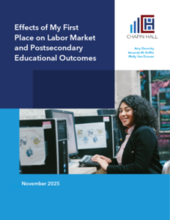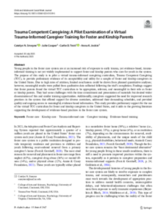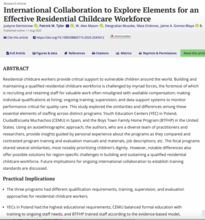Displaying 1 - 10 of 437
The Chapin Hall report evaluates the My First Place program, which provides intensive case management and fully subsidized housing to young people aging out of extended foster care in six California counties. Using data on 2,598 participants, the report finds that program completers were more likely to be employed, earned higher wages, and were more likely to enroll in and complete a semester of college compared with nonparticipants or those who did not complete the program.
This study piloted a virtual trauma-informed caregiving curriculum, Trauma Competent Caregiving (TCC), to assess its acceptability and usefulness for foster and kinship caregivers in the United States. Despite high attrition, qualitative findings indicate that caregivers found the curriculum relevant and meaningful, though they noted challenges with time demands and called for broader access to similar evidence-based training.
This study compares residential childcare workforce practices across programs in Poland, Spain, and the United States, examining recruitment, training, supervision, and performance monitoring. Findings reveal both shared priorities, such as upholding children’s dignity, and region-specific differences that suggest potential solutions and highlight the value of international collaboration to strengthen training standards.
Integrated healthcare models combining behavioral and primary care provide solutions for vulnerable pediatric populations, especially youth in foster care, facing disproportionately high rates of chronic conditions and mental health issues. This review synthesizes current literature to assess the impact of integrated care on health outcomes for youth in foster care in the U.S..
Faith to Action has developed a 3-day in-person event for U.S.-based organizations serving orphaned and vulnerable children around the world. The purpose of this event is to enhance your learning and connections in the journey of transitioning from residential care to family-based care.
This case study outlines the financial impact of the transition of Bridges Safehouse, an organization that provided support to a total of 834 children, youth and adults, through their residential and community-based intervention programs combined.
In Vancouver, Western Canada, 60 agencies and 20 youth from government care are working in partnership using a collective impact approach to address the systemic issues and barriers to healthy development that youth from care experience. This mixed-method evaluation included quantitative and qualitative data, collected through outcomes, diaries, surveys, and focus groups, to measure process and outcomes.
In this paper, authors demonstrate how a structured functional well-being assessment can be used with the custody population to promote an understanding of behavioral health needs, inform case planning, and measure functional improvement over time.
The purpose of this critically appraised topic was to analyze the effectiveness of transitional programming for youth leaving the foster care system on increasing abilities of community integration.
The current study assessed the efficacy of the Attachment and Biobehavioral Catch-up intervention for reducing behavior problems in 122 children adopted internationally.





